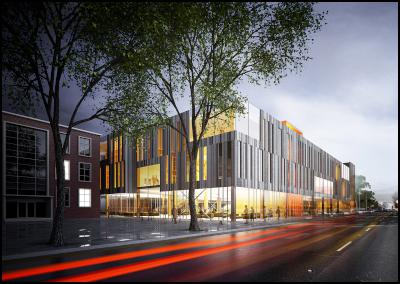Bold new building for Engineering and Architectural Studies

Under embargo to 1pm, 1 October 2015
Bold new building will attract attention to Engineering and Architectural Studies at CPIT
CPIT’s new Engineering and Architectural Studies building will inspire future generations of engineers and architectural designers with an elegant facility designed to reflect innovative learning and teaching.
Architecture firm Jasmax has been working closely with CPIT to create a flagship building on busy Moorhouse Avenue and after months of collaboration have released a concept design outlining the major design themes.
Transparency, future focussed learning spaces, sustainability and expressed structural elements are key themes.
Jasmax’s design of the facade began with the concept of a Maori cloak, both for sheltering the building and for conferring mana, or respect, on the building as a significant place of learning. Transparency of the facade on the ground floor will draw attention to a range of activities in areas designed for multi-purpose use from exhibitions to industry events.
The three-storey, 6,550m2 building will cater to up to 1000 people and is scheduled for completion in 2016.
Jasmax Associate Principal Richard Hayman says sustainability has informed the project from the outset. “In terms of the rebuild, designers are working towards a green, sustainable city – a key aim of the city’s population - whilst at the same time balancing a large proportion of a project’s budget on engineering and foundations; an imperative for ensuring safety. CPIT are embracing both of these perspectives equally, and so, with a strong sustainability focus, we are working with the institute to enhance the resource efficiency and performance of the building.”
CPIT Chief Executive Kay Giles said the new building was set to fulfil its brief of celebrating innovative learning at the institute’s Department of Engineering and Architectural Studies. “We are training the architectural designers, engineers, interior designers and quantity surveyors who will contribute to the rebuild of Christchurch in the years to come and we want them to learn in a modern, sustainable and attractive environment with facilities that prepare them to excel in the workplace.”
Several CPIT graduates working at Jasmax are involved with the project. In addition, current students have completed work placements at the company and Jasmax has opened up the design process to all engineering and architectural studies students through presentations and discussions.
“I have taught in the Bachelor of Architecural Studies programme, and have found projects taken from the real world have a real connect with students. With a major project right here on campus they can see it take shape and take inspiration from the transition of design to build; this is a powerful and unique tool for communicating the design process and priorities.” Hayman says.
The $30m building will be resource efficient and will incorporate social and flexible learning spaces. It will mark the southern gateway to CPIT’s redeveloped campus.
The Engineering and Architectural Studies building is the second new construction at the Madras Street campus of the $120 million Campus Master Plan works. It follows Athfield Architects’ Whareora (Science and Wellbeing Facility), which opens at the beginning of 2015, and three new buildings at CPIT’s Trades campus.
CPIT is refurbishing both campuses over the next eight years to create more modern learning environments that align with workplaces and students’ learning needs.
Fact sheet: The Engineering and Architectural Studies building (to be further developed)
Architects: Jasmax
Engineers: Powell Fenwick
Acoustic Engineers: Acoustic Engineering Services
Resource Management Consultants: Resource Management Group
Quantity Surveyors: Davis Langdon
Geotechnical Engineers: Tonkin and Taylor
Project managers: Inovo Projects
Specifications: three-storey, 6550m2 building on Moorhouse Avenue
Brief: to create a student-focussed building that celebrates the Department of Engineering and Architectural Studies and supports educational success through social and flexible learning delivery.
Budget: $30m
Main features: social/collaborative learning spaces including a central staircase with informal meeting and teaching spaces, exposed services and engineering features, a statement façade inspired by the concept of a Maori cloak, sustainability features
Timeline: construction is scheduled to begin in early 2015 and the building will be completed during 2016.
Budget: $30m
Main features: social/collaborative learning spaces including a central staircase with informal meeting and teaching spaces, exposed services and engineering features, a statement façade inspired by the concept of a Maori cloak, sustainability features
Timeline: construction is scheduled to begin in early 2015 and the building will be completed during 2016.


 Health Coalition Aotearoa: New Bill A Vital Step Towards Tobacco-Free Future In Aotearoa
Health Coalition Aotearoa: New Bill A Vital Step Towards Tobacco-Free Future In Aotearoa National Youth Theatre: 140 Christchurch Kids Shine In National Youth Theatre’s Historic CATS Premiere
National Youth Theatre: 140 Christchurch Kids Shine In National Youth Theatre’s Historic CATS Premiere NZ Symphony Orchestra: NZSO To Tour Masterworks By Mozart, Beethoven, Haydn And More
NZ Symphony Orchestra: NZSO To Tour Masterworks By Mozart, Beethoven, Haydn And More Journal Of Public Health: Vape Shops Cluster Around Schools
Journal Of Public Health: Vape Shops Cluster Around Schools Timaru District Council: Aigantighe Art Gallery Hosts An Iconic Robin White Touring Exhibition
Timaru District Council: Aigantighe Art Gallery Hosts An Iconic Robin White Touring Exhibition Victoria University of Wellington: Dame Winnie Laban Awarded Honorary Doctorate Recognising Achievements For Pasifika
Victoria University of Wellington: Dame Winnie Laban Awarded Honorary Doctorate Recognising Achievements For Pasifika 